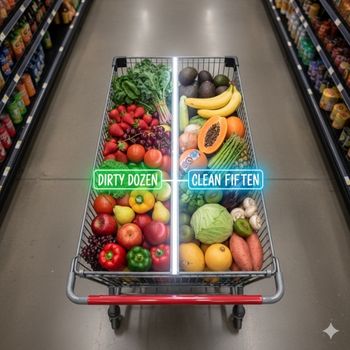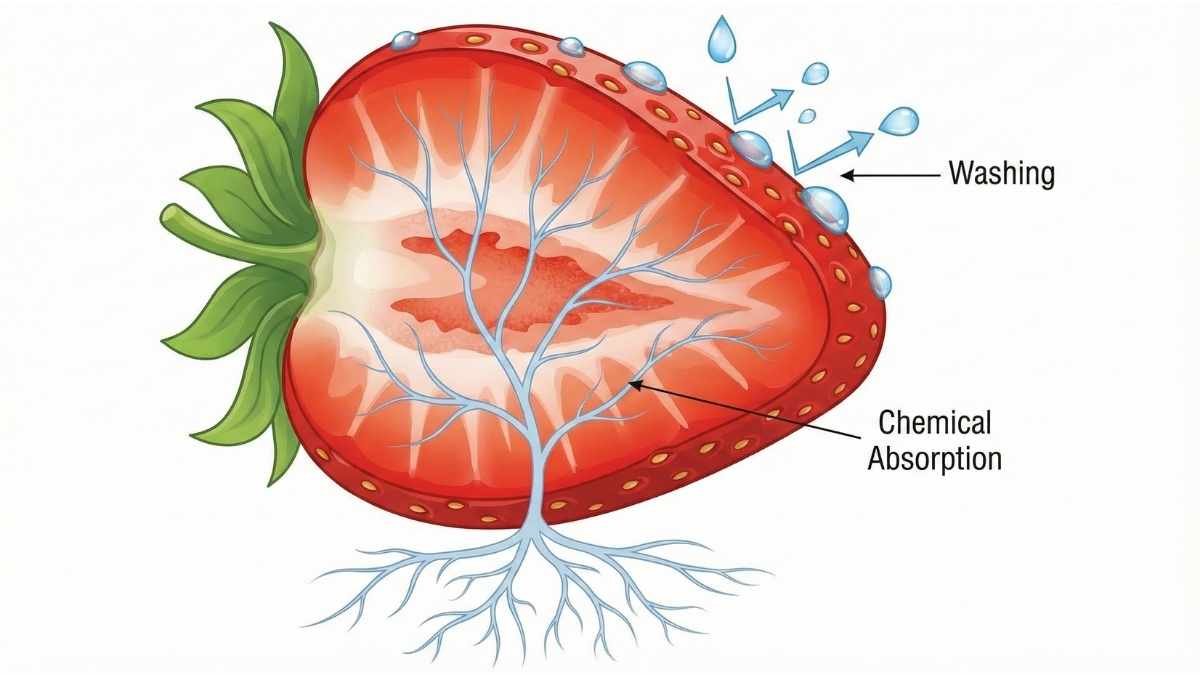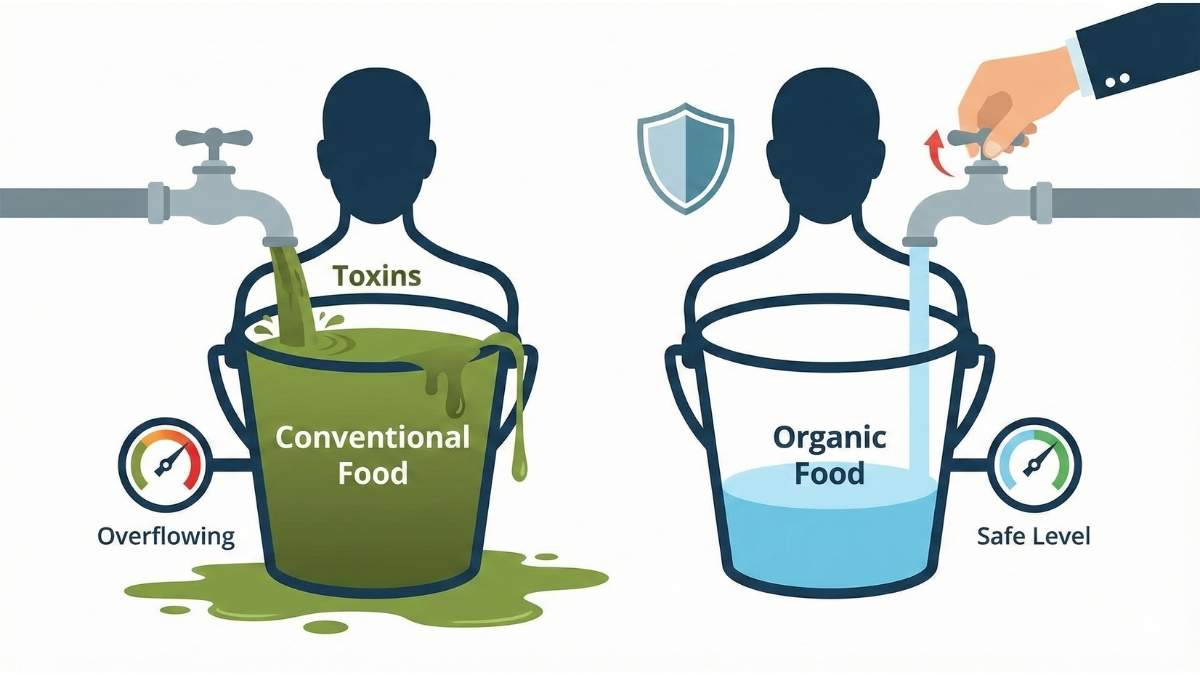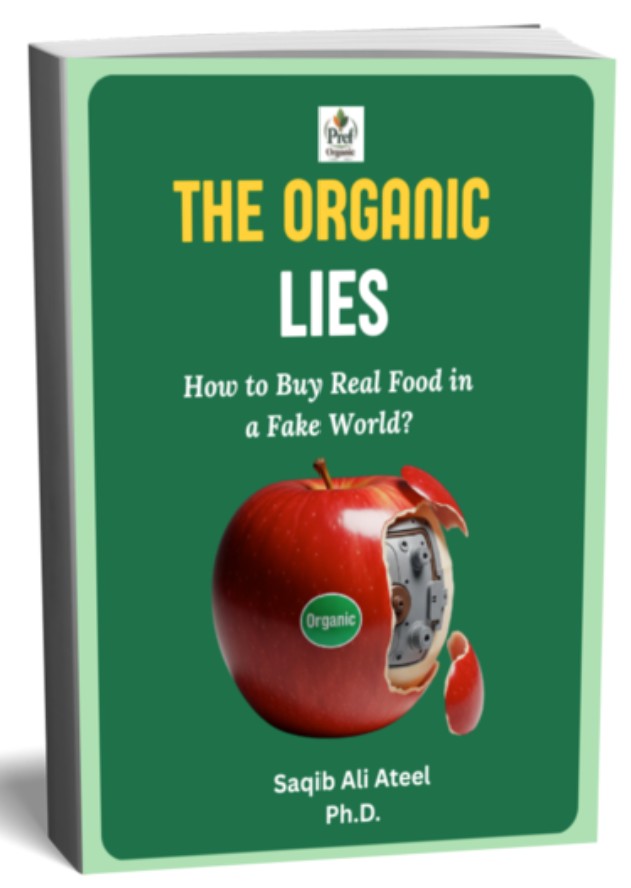What Is an Organic Food? A PhD Farmer’s Guide to the
Meaning & Purity Behind the Seal
You are standing in the produce aisle, holding two cartons of strawberries. One is conventional and cheap. The other bears the green USDA seal and costs 30% more. A dozen questions rush through your mind: Is it really safer? Is it just a scam to charge more? You find yourself asking the fundamental question: what is an organic food really, and can I justify the extra cost for my family?
I understand this paralysis completely. As a PhD researcher in agriculture and a lifelong farmer who still gets his hands dirty in the soil every morning, I know that the food industry thrives on ambiguity. They want you to believe "Natural" is the same as "Organic." It isn't.
My goal is to peel back the marketing hype and give you the strict, legal, and scientific definition of organic food, so you can shop with the confidence of an expert. Before we dive into the deep science of the "Toxic Bucket" theory and the law, here is the executive summary of what you need to know.
The Executive Summary: The PhD Farmer’s Protocol
🌱 The 30-Seconds Takeaways
- ✔ The Legal Guarantee: "Organic" is not a marketing buzzword; it is a strict federal law. It guarantees food produced without synthetic pesticides, GMOs, or sewage sludge, verified by government audits.
- ✔ The "Toxic Bucket" Effect: Your body has a limit to how many toxins it can process. Organic food acts as a filter, "turning off the tap" of daily chemical exposure to prevent your bucket from overflowing.
- ✔ The Washing Paradox: You cannot wash off "systemic" pesticides. Conventional crops absorb chemicals into their flesh. Organic farming prohibits these chemicals entirely, offering true protection.
- ✔ The 3-Year Promise: Before a farm can use the organic seal, the land must undergo a strict 3-year detoxification period. You are paying for a verified history of purity.
- ✔ Nutrient Density: By feeding the soil with compost rather than synthetic nitrogen, organic crops often develop higher concentrations of antioxidants and minerals.
The Legal Definition: Why "Organic" Is a Law,
Not a Label
When you ask, "What is an organic food?", you are asking a legal question. Unlike terms like "Natural," "Superfood," or "Clean," which have no legal definition, Organic is a federal statute. It is a comprehensive rulebook protected by the USDA National Organic Program (NOP).
The Core Definition:
Organic food is food grown and processed according to federal guidelines addressing soil quality, animal raising practices, pest and weed control, and use of additives. Organic producers rely on natural substances and physical, mechanical, or biologically based farming methods to the fullest extent possible.
To truly understand the organic food meaning, you must realize it is a system of "verified exclusion." It is defined as much by what is not allowed as by what is.

The 4 Pillars of Organic Integrity
To earn that seal, a farmer must adhere to four non-negotiable promises. If they break even one, they lose their certification.
1. The Soil Promise (No Synthetic Fertilizers)
Conventional farming feeds the plant with synthetic nitrogen. Organic farming feeds the soil. By using compost, cover crops, and manure, organic farmers build a living ecosystem. Think of soil like a bank account; conventional farming makes withdrawals, while organic farming makes deposits that build long-term wealth (fertility).
- The Result: Plants that fight for their own survival, often producing higher levels of defense compounds (antioxidants) that benefit you.
2. The Seed Promise (No GMOs)
Organic food is the only label that guarantees Zero GMOs (Genetically Modified Organisms) by law. You cannot plant a genetically engineered seed and call it organic. If you are confused about the difference between the Non-GMO butterfly and the USDA seal, you aren't alone. We break down the specific nuances of these labels in our deep dive.
3. The Pest Promise (No Synthetic Pesticides)
This is the most critical pillar for your health. Conventional farming uses synthetic neurotoxins to kill bugs. Organic farming uses:
- Biological Control: Releasing beneficial insects (like ladybugs) to eat pests.
- Physical Barriers: Row covers and traps.
- Botanical Sprays: Oils derived from plants (like Neem), which degrade quickly and don't linger in your body.
4. The Animal Welfare Promise
For meat, dairy, and eggs, the animal must be raised on 100% organic feed, given no antibiotics or synthetic growth hormones, and—crucially—must have year-round access to the outdoors.
Organic Food Meaning vs. Marketing Labels: Clearing the Fog
| Feature | USDA Organic 🟢 (The Gold Standard) |
"All Natural" ⚠️ (Marketing Hype) |
Non-GMO Verified 🦋 (Private Label) |
|---|---|---|---|
| Legal Definition? | YES Strict Federal Law |
NO Undefined / Vague |
YES Private Standard |
| Pesticides? | PROHIBITED (Synthetic) |
ALLOWED (Routine Use) |
ALLOWED (Routine Use) |
| GMOs? | PROHIBITED Always Non-GMO |
ALLOWED Commonly Used |
PROHIBITED Rigorous Testing |
| Antibiotics? | PROHIBITED Animal Welfare |
ALLOWED Routine Use |
ALLOWED Not Checked |
| Verification? | 👮♂️ Federal Inspection | ❌ None (Honor System) | 📝 Third-Party Audit |
The Washing Paradox: Why You Can't Scrub Off the Risk
"Can't I just wash my vegetables?"
This is the most common myth I encounter. The answer is a definitive NO.
Here is the science of the Washing Paradox:
In conventional agriculture, many pesticides are Systemic. This means the chemical is water-soluble; it is sprayed on the soil, absorbed by the roots, and pumped into the flesh of the fruit.
- The Reality: If you buy a conventional strawberry, the pesticide is not just on the skin; it is inside the berry. No amount of scrubbing, vinegar, or special soap can remove a chemical that is part of the fruit's cellular structure.
- The Organic Solution: Organic certification prohibits systemic synthetic pesticides. The only way to avoid eating them is to buy organic.

The "Toxic Bucket" Theory: Visualizing Your
Health
Why does this matter? Because of Bioaccumulation.
Think of your child's body as a bucket. Every day, they are exposed to micro-toxins from air pollution, water, and plastics. These are the "drips" filling the bucket.
- Conventional Food: Opens the faucet wide. Daily intake of pesticide residues adds a heavy flow to the bucket, pushing it closer to overflowing. An overflowing bucket manifests as inflammation, hormonal disruption, or chronic issues.
- Organic Food: Turns off the biggest faucet. By removing dietary pesticides, you drastically lower the level in the bucket, keeping your family in the "Safe Zone."
Switching to organic can reduce the levels of certain pesticides in your body by up to 90% in just a few days. We explore this incredible detox effect further in our guide on the benefits of organic food.

Organic vs. Non-Organic Food: The Great Divide
When comparing organic vs non-organic food, the primary difference lies in philosophy.
- Non-Organic (Conventional): Feeds the plant. It treats the soil as a sponge to hold the plant up, using salts to chemically force rapid growth.
- Organic: Feeds the soil. It uses carbon-based matter to feed the microbes. The microbes then feed the plant.
This difference in "feeding" creates a difference in "eating." Plants grown in organic soil often develop robust immune systems (antioxidants) to protect themselves, which then transfer to you. For a specific look at how these farming systems compare on a massive scale, including the environmental impact, read our analysis of GMO vs Organic Food.
The "3-Year Wait" – The Ultimate Trust Signal
This is the fact that usually converts the skeptics. If a conventional farmer wants to switch to organic today, they cannot sell a single organic apple for 36 months (3 years).
They must farm using organic methods (expensive) but sell at conventional prices (cheap) for three years to "detox" the land.
- Why? To ensure the soil is free of prohibited substances.
- The Takeaway: When you see that green seal, you are paying for that farmer's 3-year sacrifice. You are buying a verified history of purity.
How to Read the Label: The "9" vs.
"4" Code
When you are in the store, look at the PLU (Price Look-Up) sticker on the fruit. It is a secret code for consumers in the know.
- Starts with 9 (e.g., 94011): Organic. Grown without synthetic chemicals. Safe to buy.
- Starts with 3 or 4 (e.g., 4011): Conventional. Grown with synthetic pesticides and fertilizers. Use caution.
- Starts with 8 (e.g., 84011): GMO. Genetically Engineered. (Rarely seen, but good to know).
If you are confused by labels like "100% Organic" versus "Made with Organic," don't worry. We have decoded every variation in our article on organic food label requirements.
Conclusion: Peace of Mind is Priceless ✨
So, what is an organic food?
It is not just a luxury item. It is a legal guarantee of purity in a food system that prioritizes speed over safety. It is the only way to opt out of the "Toxic Bucket" cycle.
As a PhD scholar and a farmer, my advice is simple: You don't have to buy everything organic. But for the foods you eat daily—the foods that fill your bucket—the seal is your shield. Trust the process, verify the seal, and enjoy the peace of mind that comes with knowing you are protecting your family from the inside out. ❤️
10 Core Benefits of Organic Food
Organic Food Label Requirements
- USDA Guidelines for Organic Food
- Organic vs Natural Food
- USDA Organic vs Non-GMO Project Verified
- GMO vs Organic Food
- What Makes Organic Food Organic
- Can Organic Food Be GMO
- CRISPR Organic Food
Is Organic Food Worth It (ROI)
Organic Food Benefits for Children
High-Value Resources for Further Reading
- USDA National Organic Program (NOP): The official government source for organic standards and regulations.
- Environmental Working Group (EWG): The authoritative source for pesticide data in produce.
- The Organic Center: A research hub focused on the science of organic food and farming benefits.
